#Spanish Language
Explore tagged Tumblr posts
Text
Common Verbs (Spanish)
Abrir = to open
Asister a = to attend
Aprender = to learn
Ayudar = to help
Bailar = to dance
Buscar = to look for
Caminar = to walk
Comer = to eat
Comprar = to buy
Comprender = to understand
Creer = to believe
Deber = to owe
Decidir = to decide
Descansar = to rest
Desear = to wish
Enseñar = to teach
Escribir = to write
Escuchar = to listen
Estudiar = to study
Hablar = to speak
Leer = to read
Llegar = to arrive
Mandar = to send
Mirar = to look at, to watch
Practicar = to practice, to play
Preparar = to prepare
Recibir = to receive
Regresar = to return
Tomar = to drink, to take
Trabajar = to work
Vender = to sell
Ver = to see
Viajar = to travel
Visitar = to visit
Vivir = to live
.
Patreon
#studyblr#notes#langblr#language#spanish#spanish language#spanish studyblr#spanish notes#spanish langblr#vocab#vocabulary#spanish vocab#spanish vocabulary#verbs#spanish verbs#common verbs#common spanish verbs#spanish verbs to know#spanish words#words in spanish#language learning#learning languages#learning spanish#spanish learning#romance languages#european languages#verbs in spanish#verbs to know#important verbs
72 notes
·
View notes
Text
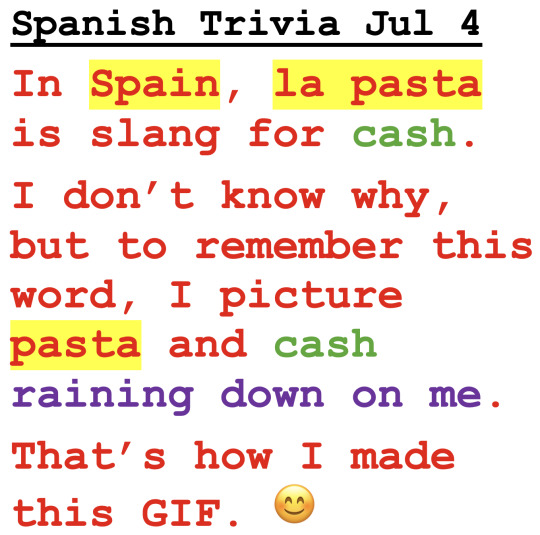
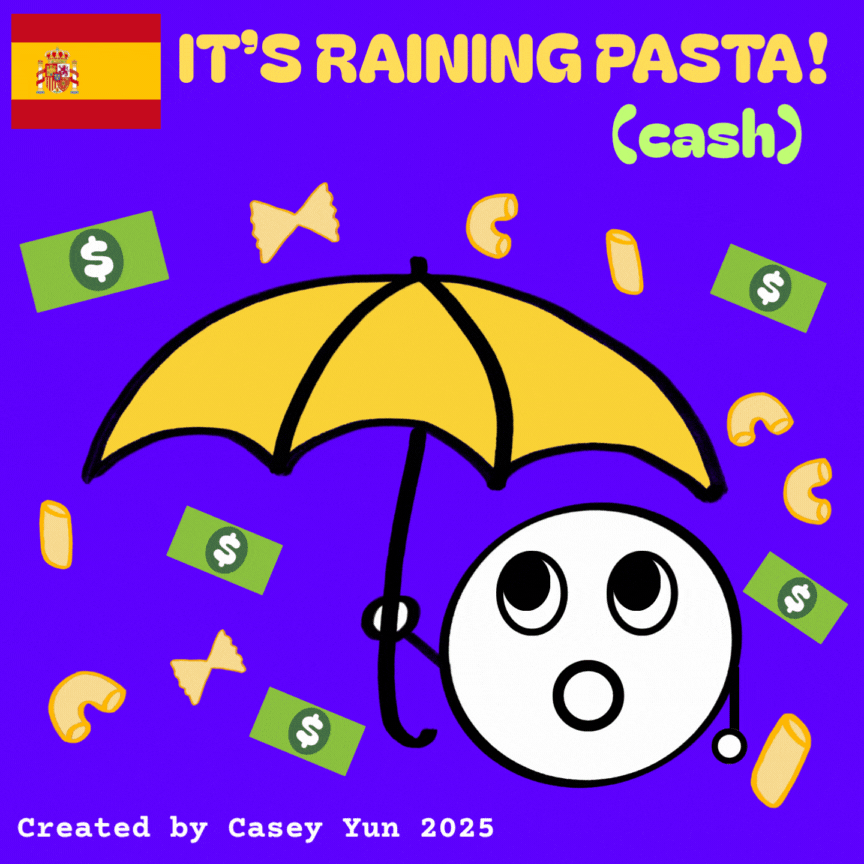
#pasta#español#cash#españa#spain#money#spanish phrases#spanish language#spanish#learn spanish#learning spanish#learning languages#hispanics#latinos#writing#creative writing#writers on tumblr#writing community#writers#writeblr#writerscommunity#writer#writers of tumblr#creativity#languages#language learning#studying#studyblr#study blog
22 notes
·
View notes
Note
I recently learned the frase "Pensar en la inmortalidad del cangrejo" and I'm obsessed with it. Now I'm curious, what are your favourite Spanish idioms that you've learned over the years?
I'll just include a few that are my personal favorites:
camarón que se duerme, se lo lleva la corriente = "you snooze you lose" [lit. "a shrimp that falls asleep is taken/swept away by the current"... and I think that's beautiful]
por la boca muere el pez = "loose lips sink ships", "keep your mouth shut" [lit. "the fish dies by the mouth" - the idea here is that a fish gets a hook in their mouth if they open it; there's also a well-known song that's a play on the expression so they have it por la boca vive el pez]
agua pasada (no mueve molino) = "let bygones be bygones", "water under the bridge" [lit. "water that's passed (does not move the mill)", basic idea of "water under the bridge"]
no es santo de mi devoción = "they're not my cup of tea" [said of people to be like "they aren't my favorite person" - but literally it's like "they aren't my patron saint"]
entre la espada y la pared = "between a rock and a hard place" [lit. "between the sword and the wall"]
ser un sol = "to be a delight" [lit. "to be a sun"; was also told you can intensify it as ser un sol de primavera "to be a spring sun"]
venir(le) de perlas = "to suit someone perfectly", "to be very useful to someone", "to come in handy" [used with indirect objects but it's like me viene de perlas which would be "this suits (my needs) perfectly" or "this will come in handy (for me)" - literally it's like "to come (to someone) like pearls"]
(costar/valer) un ojo de la cara = "(to cost/be worth) an arm and a leg" [lit. "to cost/be worth an eye from the face"]
cada muerte de obispo = "once in a blue moon" [lit. "every death of a bishop"; just means a rare event or something that doesn't happen often]
Also as far as really off the wall ones - this is possibly the strangest one you'll see
éramos pocos y parió la abuela which is literally "there were few of us and grandma gave birth"
I've also seen éramos muchos "there were a lot of us", but same general idea
The meaning behind it is like "things keep getting worse" or "everything is terrible", kind of idea. Sort of like "the hits keep on coming"
The literal translation is kind of like "there already weren't a lot of us, and then grandma gave birth" like panic and added problems. I personally think muchos makes more sense maybe, like "there were too many mouths and then grandma gave birth"
112 notes
·
View notes
Text
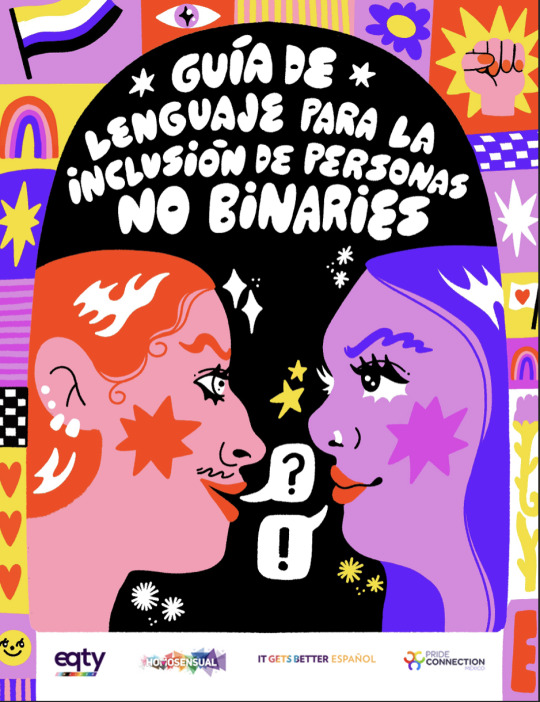
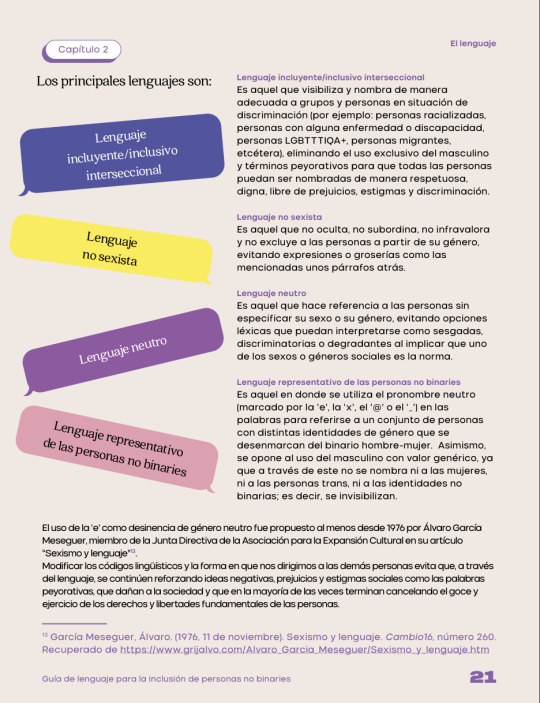

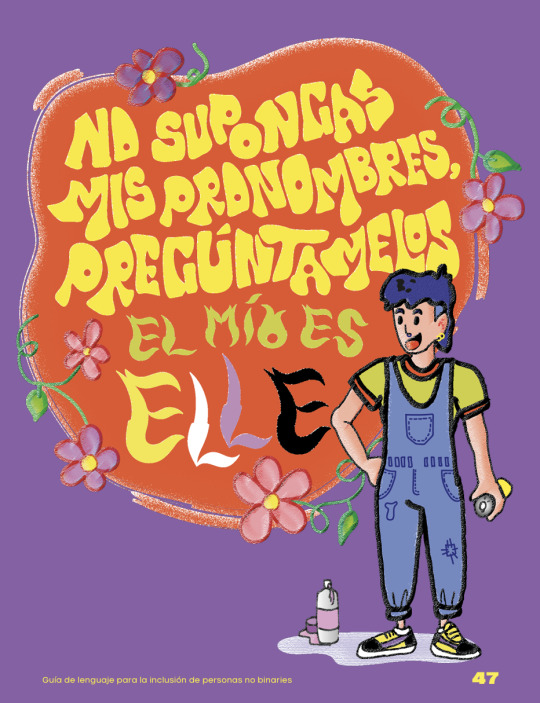
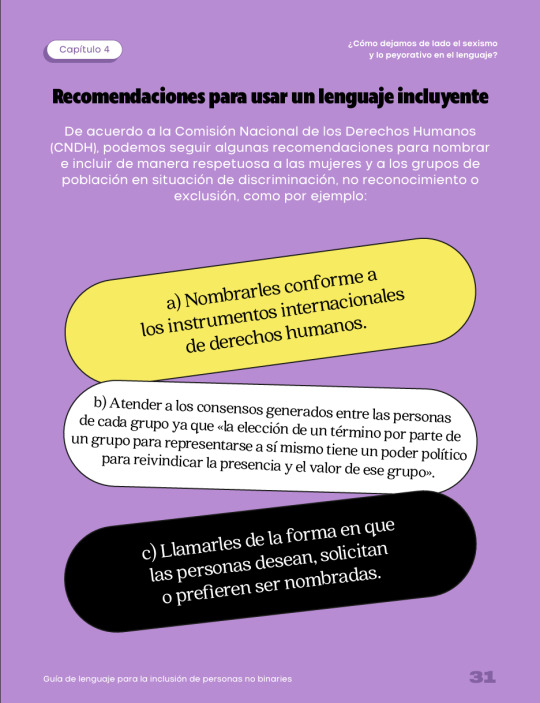
FREE downloadable guide to nonbinary language in Spanish - spread the word! 💛🤍💜🖤
How do we take a traditionally gendered language like Spanish and adapt it to be more gender inclusive?
Language is a powerful tool - this new EduGuide is amplifying non-binary voices, dismantling stigmas, and teaching us how to take a traditionally gendered language and adapt it to be more inclusive.
Our pals at It Gets Better Mexico collaborated with Homosensual to address this crucial issue within the language — download their guide for FREE and share it around to friends, family, your school, and your community: itgetsbetter.org/blog/spanish-eduguide-for-the-inclusion-of-nonbinary-people
Education like this helps create a space where every identity is seen and celebrated!
---------
El lenguaje es una herramienta poderosa - esta nueva EduGuide amplifica las voces no binaries, desmantela los estigmas y nos enseña cómo tomar un lenguaje tradicionalmente basado en género y adaptarlo para que sea más inclusivo.
Nuestres amigis de It Gets Better México colaboraron con Homosensual para abordar este tema crucial dentro del idioma — descarga tú guía GRATIS y compártala con amigues, familiares, tú escuela y tú comunidad para participar en estas importantes conversations: itgetsbetter.org/blog/spanish-eduguide-for-the-inclusion-of-nonbinary-people
¡Una educación como esta ayuda a crear un espacio donde se ve y se celebra cada identidad!
#itgetsbetter#homosensual#nonbinary#enby#genderqueer#gender neutral#gendered language#pronouns#spanish language#no binario#no binarie#latine#lgbtqia
5K notes
·
View notes
Text
Throwback to Nico Rosberg speaking in Spanish
(I love how bratty and sassy he is with this one😭)
#f1#formula 1#mercedes#nico rosberg#britney rosberg#britneymyheart#spanish language#idk if this makes sense#I’m so bad at Spanish#it’s not even funny#😭😭😭😭😭😭#he ate i fear#my diva
270 notes
·
View notes
Text
these methods are what are helping me the most to learn spanish:
1. Label Your Household Items: Place labels with Spanish names on objects around your home. This constant exposure helps reinforce vocabulary in a practical context.
2. Create a “Spanish Only” Zone: Designate a specific area or time each day where you only use Spanish. This could be a room or a period during which you read, watch TV, or speak only in Spanish.
3. Use a Spaced Repetition System (SRS) for Vocabulary: Instead of traditional flashcards, use an SRS app to review words and phrases at increasing intervals. This method helps improve long-term retention of vocabulary.
4. Write a Diary in Spanish: Keep a daily journal in Spanish. This practice helps you think in the language and improve writing skills while reflecting on your day.
5. Sing Along with Spanish Music: Choose songs in Spanish and sing along, paying attention to the lyrics. This helps with pronunciation, rhythm, and understanding colloquial expressions.
6. Learn Through Role-Playing: Act out scenarios in Spanish, such as ordering food in a restaurant or asking for directions. This method helps you practice practical language use in a fun and interactive way.
Important: Methods can change depending on what works for you, so try everything you can. Methods can also turn out to be less effective as you gain more knowledge.
obs: Spanish is my priority right now because I’m no longer learning it as a hobby but as a necessity. You are free to correct me.
#spnotesbyvi#study notes#langblr#studyblr#study motivation#study method#learning spanish#spanish language#spanish studyblr#study blog#learn spanish#espanol#espanhol#español#🇲🇽#🇪🇸#correct me if i'm wrong
163 notes
·
View notes
Text
"Fishermen" -- Federico García Lorca (1898-1936)
Fishermen
The enormous tree fishes with its lianas rare moles out of the earth.
The willow above the pool fishes for its nightingales. …but the white moon will not bite on the cypress’ green hook…nor will your heart bite on mine, little brunette of Granada.
Pescadores
El árbol gigantesco pesca con sus lianas topos raros de la tierra.
El sauce sobre el remanso se pesca sus ruiseñores. …pero en el anzuelo verde del ciprés la blanca luna no morderá…ni tu corazón al mio, morenita de Granada.
#personal#poem#poetry#translation#poetry in translation#Spanish#Spanish language#Spanish translation#Spanish poetry#Lorca#federico garcía lorca#my translations
58 notes
·
View notes
Text
*gripping bathroom sink* every foreign accent is a sign of bravery, every foreign accent is a sign of bravery-
779 notes
·
View notes
Text
Conservative Spanish-language media personalities are claiming that Trump will not deport working immigrants or those without a criminal background. In truth, Trump has vowed to stage the “largest deportation operation in American History,” and “no one is off the table.”
159 notes
·
View notes
Photo

Population with only Spanish as first language by Spanish province, 2021 census survey
by FrankCesco/reddit
79 notes
·
View notes
Text
Emotions (Spanish)
love = amor
worried = preocupado
angry = enojado
sad = triste
embarassed = avergonzada
afraid = asustado
kind = tipo
happy = feliz
amazed = asombrado
delighted = encantado
bored = perforado
tired = cansado
sensitive = doloroso
hate = odio
#langblr#spanish#spanish langblr#spanish vocab#spanish vocabulary#spanish emotions#emotions vocab#learning languages#learning spanish#spanish learning#studyblr#notes#flashcards#spanish flashcards#spanish studyblr#vocab#vocabulary#spanish words#language#spanish language#learn spanish
648 notes
·
View notes
Text
Daily Spanish Vocabulary - verbs edition
involucrar = to involve, to have to do with
garabatear = to scribble, to scrawl, to doodle [sometimes it's garrapatear but in my experience it's usually garabatear]
avisar = to warn / to inform
borrar = to erase, to delete, to wipe away
yuxtaponer = to juxtapose
amenazar = to threaten
yacer = "to lie on" / to be located [most often said of places or geography, like la ciudad yace en un cruce "the city lies on a crossroads", or it can be a fancy way of saying "lie down"... it generally tends to be a bit more literary but is like "rests upon" or "is situated on"]
cavar = to dig
excavar = to dig up [lit. "dig out"]
socavar = to undermine [lit. "dig under"]
gestionar = to manage, to arrange, to run (a business) [la gestión is another word for "management" usually in a business sense]
acabar = to carry out, to finish acabar(se) = for something to run out [like se acaba el tiempo "time is running out"] acabar de (hacer algo) = to have (just) done something [in the sense of recently] acabar con (algo/alguien) = to get rid of / to put an end to [with people it usually implies "killing" like "to finish off"]
brotar = to break out, to arise / to sprout [can be used as plants, but also un brote is "an outbreak" either of things like diseases or even pimples, or it could be when something "appears" or "happens" like an "appearance"]
jurar = to swear (an oath), to promise, to vow
unir = to join, to unite unirse = to join together, to merge
reunir = to gather together, to gather up reunirse = to meet up (people), to have a meeting
aumentar = to increase
disminuir = to decrease, to diminish
crecer = to grow, to rise, to expand / to wax (the moon) crecer(se) = to grow up
menguar = to diminish, to wane [in general and also the moon], to ebb
cerrar = to close cerrar con llave = to lock [lit. "to close with (a) key"] cerrar a cal y canto = to block up, to seal completely [a cal y canto sometimes a calicanto refers to something like brick and mortar; it's literally "lime(stone) and (brick) stone" for building materials but it means "to brick up" in a literal sense - in euphemisms it means "to seal off completely", calicanto usually refers to a brick wall or stonework]
desmoronar(se) = to collapse, to come crumbling down
eligir = to choose, to elect (someone)
desencadenar(se) = to unleash, to be unleashed [lit. "to unchain"; can be used in the sense of "to be unleashed" the dramatic way... it also can literally mean "to take off someone's chains"]
trasnochar = to stay up late, to not sleep / "to stay out all night" [sometimes "to pull an all-nighter"]
apretar = to squeeze
soplar = to blow air / for air or wind to blow
imprimir = to print
firmar = to sign
agitar = to shake / to agitate [not in terms of shaking hands (which is usually darse la mano "to give each other one's hand) - this is "to shake" like shaking a drink]
temblar = to tremble, to shudder, to shake [can also be "to shake" in the context of earthquakes]
encender = to light / to turn on (electronics)
apagar = to extinguish / to turn off (electronics)
hostigar = to plague, to annoy, to bother, to harass
enredar = to tangle, to entangle
derrotar = to defeat
rugir = to roar, to bellow, to boom
caducar = to expire, to no longer be valid
agregar = to add añadir = to add
congelar = to freeze
descongelar = to unfreeze / to thaw
equivocarse = to be wrong, to be mistaken
salpicar = to splash
enterrar = to bury
desterrar = to banish, to exile
aterrizar = to land [usually said of flying things, like birds, planes or helicopters since it is literally "to-earth" - can also be "to touch down (on the ground)"]
brillar = to shine
contar = to count / to recount, to tell a story contar con algo/alguien = to trust in something/someone, to rely on
alquilar = to rent
sangrar(se) / desangrar(se) = to bleed / to bleed out / "to bleed dry"
blandir = to wield, to brandish
reproducir = to reproduce / to play back (audio)
derramar = to spill, to spill out / to hemorrhage [you will also see derramar sangre which is "to shed/spill blood"]
quebrar = to break, to smash
torcer = to twist / to sprain (a body part)
retorcer(se) = to warp, to become twisted / to writhe [as in wood becoming "warped" after rain etc, or for the truth to be "twisted"]
abrazar(se) = to hug
abrasar = to roast, to scorch, to raze
derrumbar = to knock down, to destroy derrumbarse = (for something/someone) to collapse or break down
masticar = to chew
saludar = to greet / to salute [also understood as "waving at someone", but still technically "greeting"]
despedir = to fire (someone from a job) [it's also another word for "to give off" or "emit", but you're usually seeing this in a job setting as "to fire" or "to sack"]
despedirse (de) = to stay goodbye to, to bid farewell
arrojar = to throw, to toss
lanzar = to launch [in the sense of projectiles like launching rockets or missiles, and also "to launch (a program)" both in marketing and in TV]
podar = to trim, to prune (trees/vegetation) [usually vegetation but some people use it figuratively as "to get rid of" or "to trim off"]
amortiguar = to muffle / to cushion, "to soften the blow"
rezar = to pray
espantar = to frighten, to scare / "to scare away" [as in el espantapájaros is "scarecrow" - or lit. "scares-birds", espantar can be used in this way to mean "to ward off" in some cases]
ahuyentar = to ward off, to chase off
huir = to flee, to run away
cosechar = to harvest, to reap
velar = to stay up, to stay awake / to keep vigil / to watch over, to keep vigil over velar(se) = to shroud / to wear a veil [two separate etymologies here deriving from la vela - the first one is la vela that comes from "vigil" so it can be both to stay awake or to guard, this version is also related to la vela that means "candle", and because of that la vela can also be "sleepless" or "wakefulness", and duermevela means "fitful sleep" or "light sleep", meaning "a wakeful sleep".......... the second vela is related to "sail of a ship" or "vellum" material, where it meant cloth or a piece of fabric; that's where you get el velo "veil" and el velorio "shroud"
#spanish#langblr#learning spanish#vocabulario#la gramatica#spanish vocabulary#spanish language#long post
116 notes
·
View notes
Text

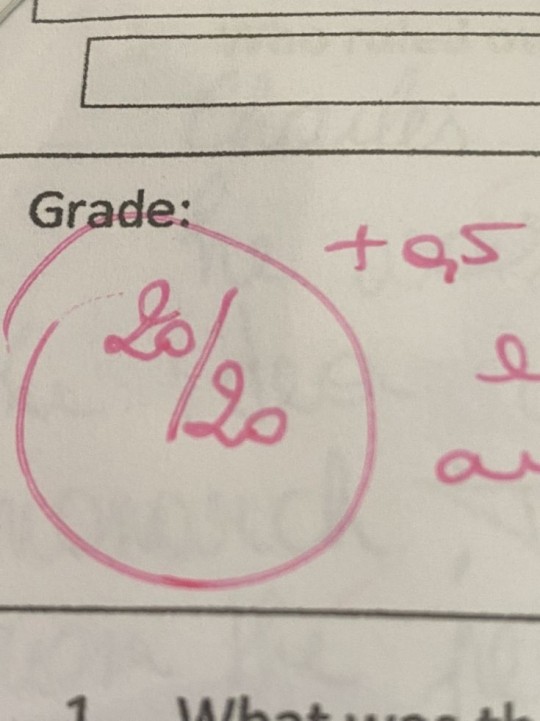
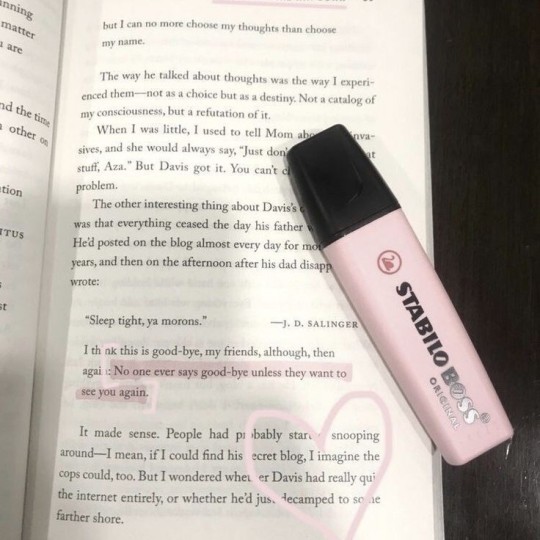
Language Resources 🎀
*that I currently use for studying Spanish. When I pick up studying Japanese again, I will make a list for that as well <3 I currently use a handful of resources for learning Spanish, and they've all proven very useful so far!
🩷 My Current Resources for Spanish
Busuu - hands down my favorite language learning app. So much better than Duolingo, in my opinion (especially for languages with a different alphabet/writing system). I bought the premium for a year, which will expire in Septmeber, but I'm debating renewing again because I love it so much.
LingQ - I like using this for reading in Spanish. It gives me different types of things to read about, and while I don't have premium, I do put all the words I don't know into flashcards on AnkiApp on my laptop and translate anything I don't know using SpanishDict.
SpanishDict - favorite translation/dictionary app. I know it has lessons you can use, tho I haven't tried it yet, but I really do love this app. It's super helpful when I'm making flashcards or writing random vocabulary notes.
Goodnotes - This is a general note-taking app, but I love it because it allows you to import and write on PDFs, and that's just perfect for me! I've downloaded free PDF short stories/children's stories in Spanish and made notes of words I don't know, and taken notes in the app too. Definitely my favorite notes app, ever.
Italki - I know this is a website, too, but I use the app. It lets you work with professional teachers/community tutors in your target language. You can have structured lessons or just use it for conversation practice. I did a trial lesson not too long ago and have an upcoming lesson booked out in about 5 days. You pay per lesson, so there is no subscription, and there are so many languages and teachers/tutors to choose from. I did a lot of research before choosing a teacher, and I'm very happy with my decision so far. Definitely useful if there's not native speakers near you or you're like me and not confident talking to people you know in your target language/their native language.
Quizlet/AnkiApp - I use AnkiApp more then quizlet, and the Anki I'm referring to is NOT the same way everyone else uses, but it's the flashcard app of preference at the moment. I tried the AnkiDroid app and hated it. But yeah, AnkiApp is useful for flashcards and I really like it. I have it on my Chromebook and my Ipad.
Netflix - I love watching shows in Spanish on Netflix so much. I am currently watching La Reina del Sur on it (used to watch that sporadically in the past at a friend's house) and plan on watching some other shows, including Elite.
Spotify - I enjoy listening to Spanish music and podcasts right now. The music is more of an entertaining/enjoyable fork of audio input, and the podcasts help me get a feel for speaking and pronunciation and I choose podcasts that speak on topics of interest tk help with vocabulary in those areas I'd like to be able to speak about.
Textbooks - I have 2 PDF textbooks, Gramatica de Uso del Español: A1-B2 and Gramatica de Uso del Español: B1-B2. I've heard these are great for learning Spanish (and they're both only written in Spanish, like there's no English in them) and plan on using them once I figure out how to take good and useful textbook notes! I definitely need to improve on my grammar.
Those are all my current Spanish resources! I'd definitely say my current level is like a high A1 right now, nearing A2, but I have just a little bit of work to do before I get there. These resources are definitely gonna help, tho!
#studyblr#study motivation#it girl#langblr#spanish langblr#study tips#language goals#that girl#langblog#language resources#foreign languages#language learning#language#langblr community#learn spanish#language learning goals#language studyblr#college studyblr#study blog#studying#language study tips#college student#student life#university student#language student#spanish#language learning tips#spanish studyblr#spanish language#study community
295 notes
·
View notes

